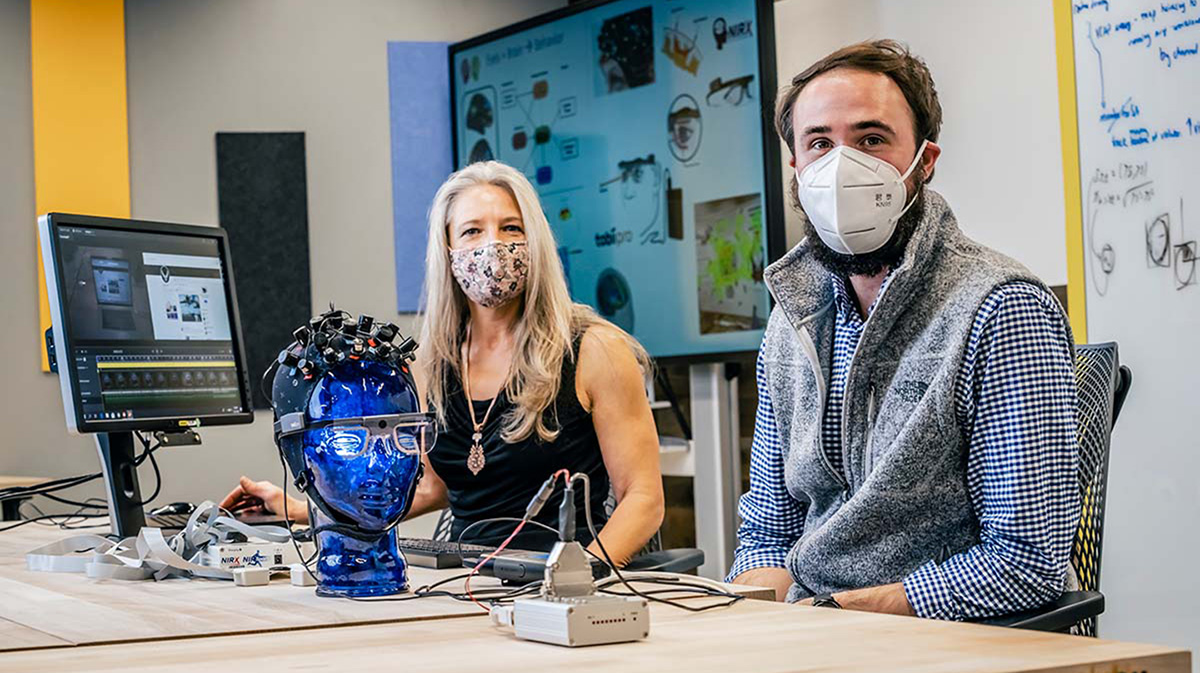Press Release
Latest Discovery Awards Fund Johns Hopkins APL-Led Projects in Public Health Messaging, Detecting Pathogens and Detecting Unconscious Bias
Three principal investigators from the Johns Hopkins Applied Physics Laboratory (APL) in Laurel, Maryland, were among researchers from across the Johns Hopkins enterprise to earn funding in the sixth round of the Johns Hopkins Discovery Awards program. Another nine staff members are on research teams that received Discovery Awards.
The program was launched in 2015 to spark collaborations across the university that promise to result in high-quality and impactful work. This year the program attracted a record 274 proposals, from which 41 teams — each composed of members from at least two Johns Hopkins divisions — received awards of up to $100,000.
COVID-19 Public Health Messaging
Two researchers from the Laboratory’s Asymmetric Operations Sector — Adam Crego, a behavioral neuroscientist and psychologist, and Jennifer McKneely, who specializes in human cognitive and human factors engineering —are working with Rupali Limaye of the School of Public Health on a project to combine neuroscience techniques (like eye tracking and functional near-infrared spectroscopy) with traditional self-reporting measures to identify aspects of public health messaging that will most likely persuade an individual to take behavioral action, such as getting a COVID-19 vaccine.
“By ascertaining the ways in which the brain and eyes interpret a message, our work will yield insights into how information should be presented in an empirical manner to best inform the public for positive behavioral change through an unbiased lens,” explained Crego, who is leading the project. “The future impact of this cognitive approach to message development will be able to cross many dimensional platforms within public health.”
Detecting Pathogens With Sugar
Dan Siegal, a scientist in APL’s Research and Exploratory Development Department (REDD) specializing in synthetic biology and complex systems modeling and analysis, is overseeing a project to develop an easy and inexpensive disease diagnostics and surveillance tool. He is working with Leslie Hamilton, a materials scientist in REDD, and Rebecca Schulman from the School of Engineering.
Rapid, easy-to-use and inexpensive tools for pathogen detection and point-of-care (POC) diagnosis are in demand around the globe, particularly in developing countries. But there are scarce supplies of pathogen DNA and RNA, which make detection difficult, Siegal explained.
“And, the state-of-the-art amplification techniques require complex reagents, sample preparation, expertise and equipment that is often incompatible with use at the POC,” he said.
His team is developing a tool with a new type of chemical amplification-based diagnostic that detects DNA or RNA sequences with an output coupled directly to commercial off-the-shelf glucose meters. “Tens of millions of low-cost and easy-to-use glucometers are already used by diabetics for daily blood sugar monitoring,” he said. “The coupling of novel chemical amplification-based detection with a straightforward glucometer output will help us deliver a new solution for pathogen detection in resource-constrained settings.”
Detecting Unconscious Bias Training in Artificial Intelligence
One of the fundamental barriers limiting the success of machine-learning algorithms is their inability to adjust to unforeseen changes in the data they need to process. Susama Agarwala, a theoretical mathematician in REDD, will use tools from differential geometry to understand and predict when certain types of machine-learning algorithms will fail to generalize appropriately on the real-world data. She is working with Chikako Mese from the School of Arts and Sciences.
In addition to the three APL-led projects, Laboratory researchers will be supporting four other 2020 Discovery grants funded during this cycle.
- “Developing Novel Methods to Extract Vital Signs to Enhance Remote Medical Monitoring through Virtual Vital Sign Abstraction and Health Status Prediction,” led by Edward Chen from the School of Medicine and including Panagis Galiatsatos from the School of Medicine as well as APL staff members Anissa Elayadi, Jason Spitaletta, Marianne Engel and Melanie Lockhart
- “Harnessing Peripheral Nerve Signals From Muscle with a Wireless, Implantable Device for Intuitive Prosthesis Control,” led by Sami Tuffaha from the School of Medicine and including Nitish Thakor from the School of Engineering, Gabriela Cantarero from the School of Medicine and Luke Osborn from APL
- “Non-invasive Low-Intensity Focused Ultrasound (LIFU) Stimulation to Recover Adult Brain Plasticity,” led by Hey-Kyoung Lee from the School of Medicine and including Grace Hwang from APL (temporarily on leave as a program director at the National Science Foundation)
- “Preventing Opioid Abuse in Chronic Pancreatitis through Local, Sustained Bupivacaine Delivery From Stents,” led by Jay Pasricha from the School of Medicine and including Christopher Stiles from APL and Kunal Parikh from the School of Engineering
“As the past year has shown, the urgent challenges we face as a society require not just daring new approaches but also cross-cutting, multidisciplinary collaborations,” said Ron Daniels, president of Johns Hopkins University in an announcement about the 2020 winners. “This year’s proposals — in number and caliber — demonstrate the extraordinary spirit of innovation and partnership intrinsic to our university. These awards will empower our faculty to work in concert together across our community in pursuit of groundbreaking research and new fields of study.”
